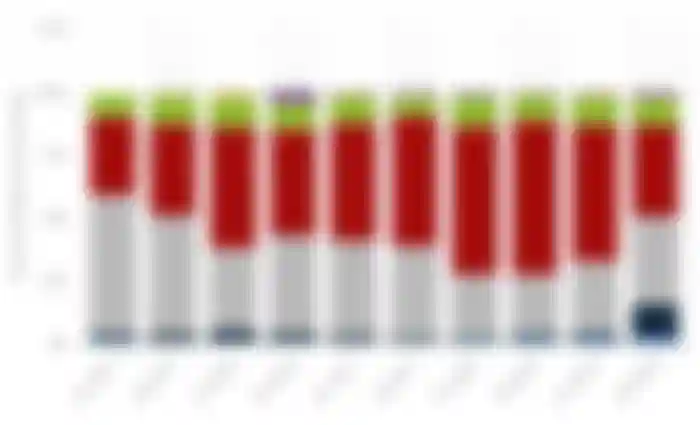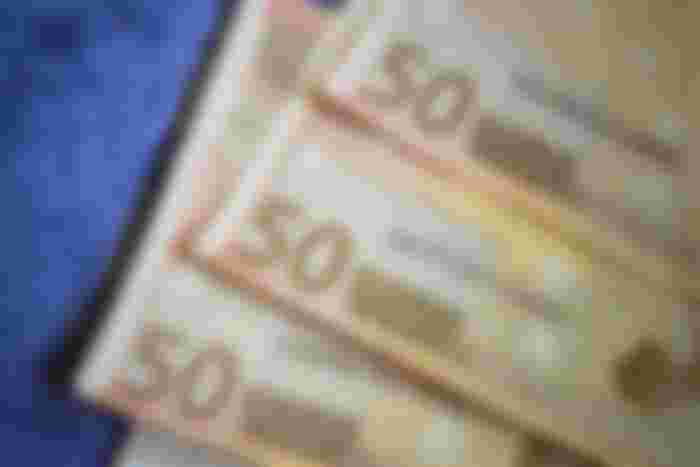I am working from home today and have spent some of the time looking at my stack of 50€ notes that are sitting by my side on the table. Sure, it is only a stack of two notes, but it is more than I have had rubbing together for quite some time. They were a gift for my birthday from my parent-in-laws, who would normally give an actual gift of some sort, but know that any extra we have goes to house renovation, so this is far more practical.

The money itself is actually pretty impressive, as it contains dozens or more security features, although I don't think they go as far as the Australian polymer notes. But just under visual inspection, there is a massive amount of detail, embosses, holograms and print quality that goes into producing the note itself to reduce the risk of counterfeiting. Although I do wonder, is it a problem.
The number of counterfeit notes withdrawn from circulation

The denomination of counterfeit notes withdrawn

The number of counterfeits withdrawn are falling, likely due to the decrease in the US of cash in general, but there is still a "fair" amount of value being attempted to be scammed.
For example, 2019 H2, 36% of the notes taken out of circulation were 50s, like the ones sitting on my desk which I assume are real. With 308,000 notes confiscated, that means that about 110,000 were 50s or approximately 5.5 million euros worth.
Despite the total number of counterfeits increasing by almost 23 percent between the first and second half of 2019, the chances of coming across a counterfeit note in Europe is exceedingly rare. In total, there are approximately 24 billion euro notes in circulation, totaling nearly 1.3 trillion euros. source
Yes, 5.5 million euros worth of fake 50s is a fair amount for the average person, but in the grand scheme of the 1.3 trillion dollars worth of circulating currency, it is not very much at all. I have no idea how much is spent combating counterfeit money, but I guess that while it is in circulation, it has to be done, as must all the measures to secure the money itself, otherwise the problem will ramp up.
However, what is interesting, is that Europeans are estimated to spend north of 15 billion dollars annually on counterfeit medicines, although it is largely unknown what the real number is. I am guessing if they are going to be looking to get the most "bang for their buck" so to speak, efforts on counterfeit goods is likely where they should be spending most of their time, if they want to curb the effects on people.
More than 120,000 people a year die in Africa as a result of fake anti-malarial drugs alone, says the World Health Organization, either because the drugs were substandard or simply contained no active ingredients at all.
I wonder what is being done about this in Africa? I suspect, not that much.

Back to the money.
Of course, when it comes to digital money, security is also a concern, but I wonder how many people are sitting with "fake Bitcoin" in their wallet at the moment and what percentage of counterfeit Hive is circulating on the platform, giving votes to people without them realizing that the value they have received is a lie.
Oh - yeah, I don't really have to concern myself about this at all.
All of the scam in digital blockchain assets is in the ecosystem of humans, not on the blockchains itself, meaning that while someone can for example sell someone Bitcoin for fiat or another token and not deliver, they can't deliver something fake onto the Bitcoin network. This makes the idea of counterfeit moot, which is why the Non-Fungible Tokens (NFTs) are going to be so huge in the industries, as people will be able to increasingly find ways to ensure that what they have is genuine.
As normal, people are the weakest link in all security considerations, as we tend to make a lot of mistakes in the way we deal with our security issues. It could be that we use weak or repeated passwords on sites that do not have strong security measures in place, which is another human error. Or, we are too trusting and give out our details to other humans looking to take advantage of us, yet I think that the trust is often "greed" where we ignore the risks as we eye the dollar signs in the future - something we see in the people who get sucked into Discord scams and send tokens to random people to unlock a prize or get some kind of return that is obviously too good to be true.
There are many ways we can be scammed, as we just don't have the bandwidth to keep everything in focus all of the time, especially as we are continually doing many things simultaneously. I don't know about you, but I do not check every banknote I receive to ensure it passes the eye level tests, which means that most likely, they aren't taken out of circulation by "end users" at all. Rather, it is when they are passed through the automated machines at banks that they are detected, as to the untrained naked eye, very few of the fakes would be identified.
I find money increasingly interesting and boring at the same time. It is interesting because of the way it affects us socially and what we are able to do with it, but it is boring because in and of itself, it is valueless and totally useless. What gives it value is the ability to exchange it for goods and services that we need and want, and to incentivize activity. Increase teacher salaries to the same as that of a hedge fund manager, and see how good the next generation of classroom teachers could be, as the competition to get trained and be highly rated would be intense.
Of course, just like dealing with malaria in Africa, nothing like this will ever be done as while people say "children are our future", very few will put their money where their mouth is. It is the same for improving environmental conditions or general well-being of people - until there is money in "doing good", very little will be done.
But it is up to all of us, and doing good has to be firstly demanded and then the responsibility of it has to be decentralized. For example, no government can ensure everyone recycles, yet in Finland, near 100% of the drink cans and bottles are returned to recycling centers, because there is incentive to do so, as there is a rebate. In fact, the rebate is paid at purchase, which means not returning the cans means paying a premium, with that premium being harvested by people who collect cans and return them themselves, for example at large events and from going through bins. Yet, as far as I know, there are no "counterfeit bottles" in the system, as the cost to do so is far too great for the return to do so.
Incentive drives everything we intentionally and much of what we unconsciously do and it doesn't matter if the activity leads to positive or negative outcomes for us or others immediately or well in the future. What this means is that it is up to us if we want to incentivize good activity and our failure when we do not. This is becoming especially true as we start to take the generation and distribution of the value that can buy good and services into our own hands, as there ends up being no government to blame, no central point to target.
Centralization is a massive weakness in systems that are prone to various types of attacks, but it is good to remember that decentralization means that when things go wrong, when things don't get done and when failure happens - we have to look in the mirror. The coming economy means, we can no longer fake a functioning society, we have to become one. This is going to take more than having secure currencies, it is going to require humans to act well. The benefit is, we are the ones who choose which actions get rewarded.





